Lecture Six(10.22)
- 格式:ppt
- 大小:300.50 KB
- 文档页数:32

选修六M5课时讲义外研版选修六M5课时讲义课堂导入在空白处填入适当的内容(1个单词)或括号内单词的正确形式。
1.While ________ (study) at university, he discovers the secret of how to create life.答案:studying2.However, the monster, ________ has learnt to speak, is intelligent and has human emotions.答案:who3.________ the end of the story, the monster disappears into the ice and snow ________ (end) his own life.答案:At; to end4.It was on a cold November night ________ I saw my creation for the first time.答案:thatagreed.答案:that知识讲解1beneficial adj.有益的;有用的Do you think cloning may be beneficial/ helpful to humans?(P61)你认为克隆对人类有益吗?(1)be beneficial to=be of benefit to对……有利/有益处(2)benefit v. 有利于;受益;获利n. 益处;好处benefit sb./sth. 对某人/物有益benefit from/by 从……中获益;得益于for the benefit of sb.=for sb.'s benefit 为了某人的利益;为了帮助某人①[2019·辽宁高考,阅读理解A]While more notes are beneficial,_if the notes are takenmindlessly, the benefit disappears.虽然记更多的笔记有好处,但如果盲目地记笔记,那好处也就消失了。
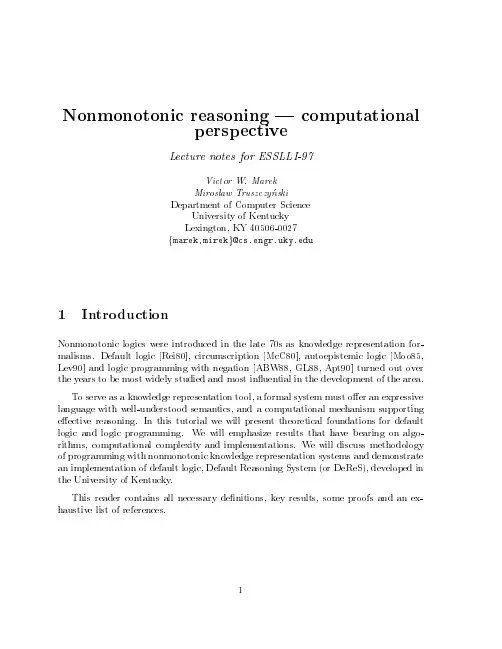

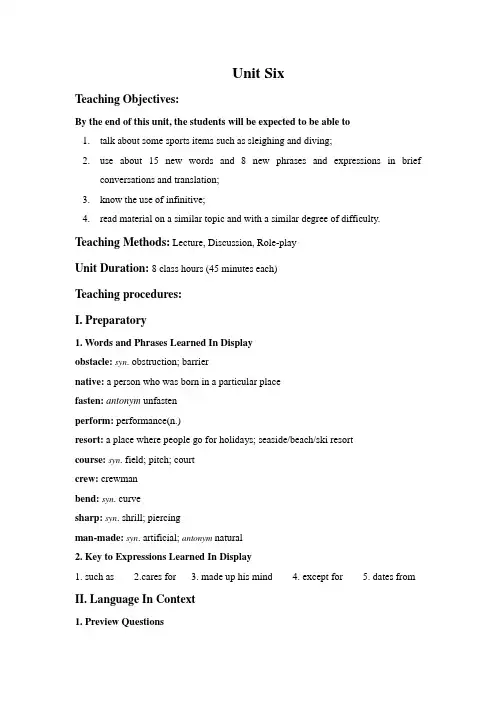
Unit SixTeaching Objectives:By the end of this unit, the students will be expected to be able to1.talk about some sports items such as sleighing and diving;e about 15 new words and 8 new phrases and expressions in briefconversations and translation;3.know the use of infinitive;4.read material on a similar topic and with a similar degree of difficulty. Teaching Methods: Lecture, Discussion, Role-playUnit Duration: 8 class hours (45 minutes each)Teaching procedures:I. Preparatory1. Words and Phrases Learned In Displayobstacle: syn. obstruction; barriernative: a person who was born in a particular placefasten:antonym unfastenperform: performance(n.)resort: a place where people go for holidays; seaside/beach/ski resortcourse:syn. field; pitch; courtcrew: crewmanbend:syn. curvesharp:syn. shrill; piercingman-made:syn. artificial; antonym natural2. Key to Expressions Learned In Display1. such as2.cares for3. made up his mind4. except for5. dates from II. Language In Context1. Preview Questionsi.Do you have any favorite sports? What are they? Why?ii.Please list some sports that require two players.iii.Can you name any favorite Chinese or international sports players?Keys for reference:① there are various answers according to the individuals. The following expressions may be of assistance.Basketball is one of my favorite sports. I like watching NBA because it not only brings entertainment to the inspectors, but I have learnt the importance of teamwork.②Sports that require two players include badminton, table tennis, tennis, fencing, chess, judo, wrestling and so on.③ My favorite sports players are Yao ming, Beckham, Iverson, Liu Xiang, Lang Ping, Luo Xuejuan, and Schumacher. Of the many sports players, I like Liu Xiang best. After he won the gold medal in 110 meter hurdles at 2004 Olympic Games, Liu Xiang became the idol in my heart. He is worth the title of “the person who moves Chinese in 2004”.2. Information Related To The Texti.EskimosAny member of a group of peoples who, with the closely related Aleut, constitute the chief element in the native population of the Arctic and sub-Arctic regions of Greenland, Alaska, Canada, and far eastern Russia.Self-designations vary among the languages and dialects of the Eskimo peoples.They include such names as Inuit, Inupiat, Yupik, and Alutiit, each of which is a regional variant of “the people” or the “real people.” The oldest known Eskimoculture is that from a site on Umnak Island in the Aleutians, for which an age of 3,018 (plus or minus 230) years was recorded. In the late 20th century there were an estimated 17,000 self-described Eskimo: some 51,000 in Greenland and Denmark, 43,000 in Alaska, 21,000 in Canada, and about 1,6000 in Siberia.Traditional Eskimo culture was totally adapted to an extremely cold, snow-and icebound environment in which vegetable foods were almost nonexistent , trees were scarce, and caribou , seal, walrus, and whale meat, and fish were the major food sources. Dogsleds were the basic means of transport on land. Eskimo clothing was fashioned of caribou furs, which provided protection against the extreme cold. In summer many Eskimos lived in animal-skin tents. Their basic social and economic unit was the nuclear family, and their religion was animistic.ii. HollandHistorical region of the Netherlands, divided since 1840 into the provinces of Noord-holland (north Holland) and Zuid-holland). It constitutes the flat, low-lying northwestern portion of the modern country.Holland originated in the early 12th century as a fief of Holy Roman Empire and was ruled by a dynasty of counts that traced its origin to the 9th century. These nobles had reemerged in the 10th century after Viking devastation of the coastal area had ended, and they proceeded to expand their territory of present Noord-Holland northward, at the expense of the Frisians, and eastward and southward, which involved them in a series of wars with the bishops of Utrecht.The name Holland was derived from the region around Dordrecht, which was known as Holtland(“wooden land”).3. Language Points1. Many sports began as ways to overcome obstacles.obstacle n. thing in the way that either stops progress or makes it difficulte.g. Not being able to pass his mathematics exam proved an obstacle to his career.2. Natives of northern countries such as Lapps, Finns, and Eskimos were the first experts in sleighing and sledding.native n.1) person born in a place, country, ect, and associated with it by birthe.g. a native of London, Wales and India.2) local inhabitante.g. when we’re on holiday in Greece, we live like the natives.3. Eskimos raced across frozen ground at breakneck speedbreakneck adj. dangerously faste.g. drive, ride, travel, ect at breakneck speede.g. a football pitch illuminated with floodlights4. Sleighing by boats dates from the seventeenth century.date back to/from have existed sincee.g. This castle dates from the 14th century.Our partnership dated back to 1960.5. The Dutch made up their minds to sail their boats with runners fastened beneath the bow, or front, a boat became a sleigh.Make up one’s mind come to a decisione.g. I’ve made up my mind to be a doctor.Have you made up your mind where to go for your holiday?6. The riders, except for the driver, bend backward.Except (for sb./sth.) not including (sb./sth.); but note.g. The restaurant is open every day except Monday.I can answer all the questions except for the last.She remembered nothing (about him) except that his hair was black.7.It is simply a board bound to two well-oiled runners.bind v. tie or fasten, e.g. with ropee.g. they bound his legs so he couldn’t escape.He was bound to a chair and left.8. Sleighs still perform the same task.Perform v.1) do (a piece of work, something. One is ordered to do, something. One has agreed to do)e.g. perform an operation to save his life2) act (a play), play (a piece of music) or to do tricks to entertain an audiencee.g. they are performing his piano concerto tonight.III. Toward Productive LanguageLanguage Points1. For two years, not once did she clamber onto a board.clamber v. climb, esp. with difficulty or effort , using the hands and feete.g. The children clambered over the rock.2. Fu joined the diving camps at age 7 and was shipped off to a Beijing sports schoola couple of years latership sb./sth. off send sb. awaye.g. the children had been shipped off to a boarding-school at an early age.3. Occasionally they would come to diving meets in her native Hubei province, and would scan the audience from the platform trying to locate them.occasionally adv. now and then; at timese.g. he visits me occasionally.4. In January, less than a year after she re-emerged, her crisp dives captured a silver medal at the Diving World Cupcapture v.1) take or win (sth.) by force or skille.g. capture a town2) take (sb./sth) as a prisonere.g. capture an escaped convictthis advertisement will capture the attention of TV audiences.IV. Homework1.Dictation of the new words;2.More grammar exercises(present participles);3.Translation (from Chinese to English)1)英语不是我们的母语。
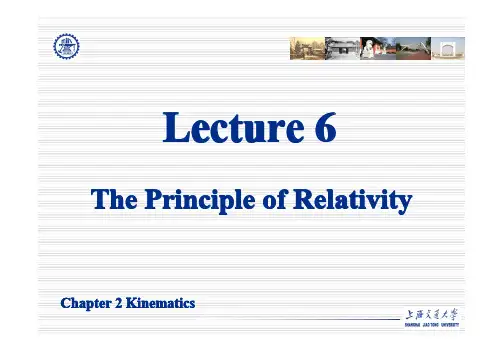

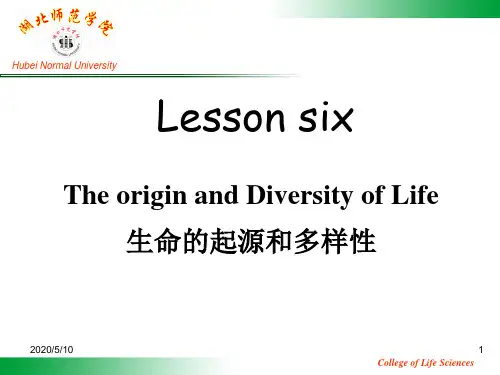

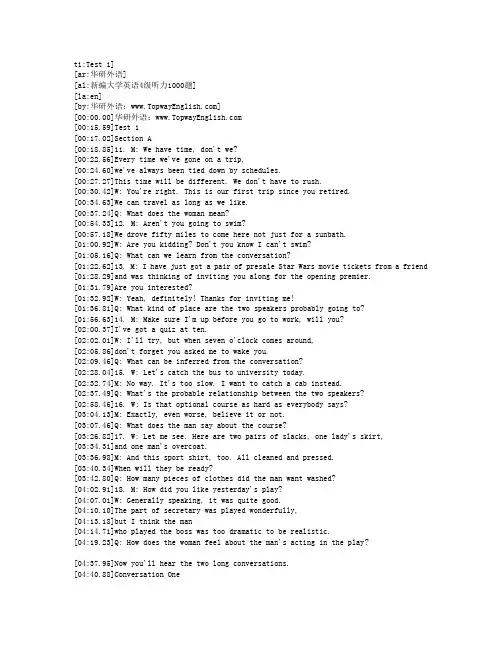
ti:Test 1][ar:华研外语][al:新编大学英语4级听力1000题][la:en][by:华研外语:][00:00.00]华研外语:[00:15.59]Test 1[00:17.02]Section A[00:18.85]11. M: We have time, don't we?[00:22.56]Every time we've gone on a trip,[00:24.60]we've always been tied down by schedules.[00:27.27]This time will be different. We don't have to rush.[00:30.42]W: You're right. This is our first trip since you retired.[00:34.63]We can travel as long as we like.[00:37.24]Q: What does the woman mean?[00:54.33]12. M: Aren't you going to swim?[00:57.18]We drove fifty miles to come here not just for a sunbath.[01:00.92]W: Are you kidding? Don't you know I can't swim?[01:05.16]Q: What can we learn from the conversation?[01:22.62]13. M: I have just got a pair of presale Star Wars movie tickets from a friend [01:28.29]and was thinking of inviting you along for the opening premier.[01:31.79]Are you interested?[01:32.92]W: Yeah, definitely! Thanks for inviting me![01:36.81]Q: What kind of place are the two speakers probably going to?[01:56.63]14. M: Make sure I'm up before you go to work, will you?[02:00.37]I've got a quiz at ten.[02:02.01]W: I'll try, but when seven o'clock comes around,[02:05.86]don't forget you asked me to wake you.[02:09.46]Q: What can be inferred from the conversation?[02:28.04]15. W: Let's catch the bus to university today.[02:32.74]M: No way. It's too slow. I want to catch a cab instead.[02:37.49]Q: What's the probable relationship between the two speakers?[02:58.46]16. W: Is that optional course as hard as everybody says?[03:04.13]M: Exactly, even worse, believe it or not.[03:07.46]Q: What does the man say about the course?[03:26.82]17. W: Let me see. Here are two pairs of slacks, one lady's skirt,[03:34.31]and one man's overcoat.[03:36.98]M: And this sport shirt, too. All cleaned and pressed.[03:40.34]When will they be ready?[03:42.80]Q: How many pieces of clothes did the man want washed?[04:02.91]18. M: How did you like yesterday's play?[04:07.01]W: Generally speaking, it was quite good.[04:10.10]The part of secretary was played wonderfully,[04:13.18]but I think the man[04:14.71]who played the boss was too dramatic to be realistic.[04:19.23]Q: How does the woman feel about the man's acting in the play?[04:37.95]Now you'll hear the two long conversations.[04:40.88]Conversation One[04:43.39]W: Excuse me, Dr. Tyler, your secretary said I should come right in. [04:48.35]M: Please do, Jenny. How can I help you?[04:50.85]W: I need to get your signature on my schedule card here,[04:54.46]on the line above advisor's approval.[04:57.33]M: Sure, but let's look it over together first.[05:00.33]How many courses do you have here?[05:02.04]W: Six.[05:02.80]M: Six? That's quite a heavy load. Any particular reason?[05:06.65]W: I had to drop my chemistry course last semester[05:10.22]when I went into the hospital, so I need to take it again.[05:14.28]M: So you've already learnt a lot of the material.[05:16.68]W: Right. And calculus is a part of the second year requirement.[05:21.74]M: Let's see, Chemistry, Calculus.[05:24.46]Oh, I see you'll be in my seminar on the modern American novel.[05:28.59]W: Yes, I'm looking forward to it and the romantic poetry seminar, too. [05:34.41]M: Two seminars? That is rather a lot.[05:37.19]Can you handle the work?[05:38.71]W: I think so. The introductory economics is fairly easy[05:43.26]and so is the music course.[05:45.14]M: Well, then I'll be happy to sign the card.[05:47.98]However, I insist that you come and see me[05:50.51]after the first week of classes[05:52.43]so we can make sure this isn't too much for you.[05:55.28]W: That's a promise.[05:57.88]Questions 19 to 22 are based on the conversation you have just heard. [06:03.16]19. Which grade is the student in?[06:22.86]20. Why has Jenny come to see Dr. Tyler?[06:42.45]21. What does Dr. Tyler seem to be most concerned about?[07:02.89]22. Which course hasn't Jenny taken?[07:22.68]Conversation Two[07:24.60]W: Hi. How can I help you?[07:26.85]M: Yes, I'd like to return this sweater for a refund.[07:29.83]I bought it a week ago.[07:31.61]W: Well, first of all, what seems to be the problem?[07:35.35]M: Well, isn't it obvious by just looking at it?[07:38.30]The first time I washed and dried it,[07:40.27]the thing shrank at least five sizes.[07:42.80]It wouldn't even fit a snake.[07:44.87]W: Uh, I see what you mean,[07:47.00]but did you follow the washing instructions?[07:50.18]I think it says here... yeah... right here on the label[07:53.88]to hand wash it and then to dry it on low heat.[07:57.78]M: How was I supposed to know that?[07:59.42]The label is written in Chinese![08:01.46]And something else:[08:02.70]the color faded from a nice dark blue to a seaweed green.[08:06.69]What kind of merchandise are you trying to sell here anyway?[08:09.85]W: Listen, sir. We take a lot of pride in our clothing.[08:14.07]What I can do is allow you to exchange the sweater for another one. [08:18.36]M: I don't want to exchange it for anything![08:20.24]I just want my money back![08:21.90]W: Well, I can give you credit on your next purchase,[08:25.13]and since the item you purchased was on clearance,[08:28.18]we can't give you a refund.[08:30.46]M: A clearance item! There wasn't anything on the price tag[08:33.39]or on the clothing rack that said anything about that.[08:36.23]W: I guess you didn't read the fine print in our ad.[08:39.57]Look. Here's the ad, and the information[08:42.65]about the clearance sale is right here[08:44.88]at the bottom on the back page.[08:47.62]M: Where? There? What? That small print.[08:52.72]You'd need an electronic microscope to see those words.[08:56.72]Questions 23 to 25 are based on the conversation you have just heard. [09:03.44]23. What's the purpose of the man returning to that store?[09:24.82]24. What is one reason why the man wants to return the item?[09:46.84]25. Which is one of the reasons mentioned[09:51.38]why the sales clerk can't help the customer with his request?[10:12.15]Section B[10:13.30]Passage One[10:14.82]The secret of a long and happy marriage appears[10:18.08]to be not to expect too much from it.[10:21.11]Far better, US researchers say,[10:23.68]to aim low to ensure you are not disappointed.[10:27.39]The key to keeping that newlywed glow[10:30.43]appears to be forgiveness and communication.[10:34.08]The study by researchers from Ohio and Florida Universities[10:38.63]looked at 82 couples.[10:40.71]They quizzed all the spouses independently over four years.[10:45.17]Writing in the Journal of Personality and Social Psychology,[10:49.62]researchers led by James McNulty,[10:52.25]professor of psychology at Ohio University, said:[10:55.95]"In contrast to the idea that expectations[10:59.73]in the early years of marriage exert main effects[11:02.97]on satisfaction, the current findings suggest[11:06.13]that the effects of expectations interact with the skills[11:09.72]partners bring to their relationships."[11:12.82]The study also found that people tend to select like-minded partners [11:17.79]who they believe will be able to maintain a stable relationship. [11:22.18]The finding contradicts the old belief that opposites attract. [11:26.90]Instead, the US researchers said[11:29.32]people looking for long-term relationships[11:32.31]should select partners who were similar to themselves,[11:35.61]rather than seeking out the highest quality partner available.[11:40.97]Questions 26 to 28 are based on the passage you have just heard. [11:47.56]26. What is the key to a happy marriage according to the study? [12:09.60]27. How many people are investigated in the study?[12:30.71]28. Which is the belief of the researchers?[12:51.57]Passage Two[12:53.94]Do you have a tough math test coming up?[12:57.13]Then listen to some classical piano music just before the test.[13:01.88]You might end up with a higher score.[13:05.37]Researchers at a university in California conducted an experiment.[13:10.75]They asked a group of college students to listen to some piano music[13:15.15]by a famous 18th century composer before taking a math test.[13:20.88]They were surprised to find that the students' scores jumped 8 to 9 points. [13:26.84]The music seems to excite nerve activities in the brain[13:30.53]similar to the activity that occurs[13:32.85]when a person is figuring out a math problem.[13:36.02]However, the scientists warn that[13:38.25]before you get too excited about applying this method to your math test, [13:42.62]you should remember[13:44.14]that brain-exciting effects last only 10 to 15 minutes.[13:49.41]Would rock music work as well as the piano music did?[13:52.90]No, the scientists say. In fact,[13:56.05]the less complex music might even interfere[13:59.23]with the brain's reasoning ability.[14:03.35]Questions 29 to 31 are based on the passage you have just heard.[14:10.03]29. What is this passage mainly about?[14:30.84]30. Why can classical music play a positive role in problem solving?[14:52.08]31. What is one of the findings of the research?[15:12.74]Passage Three[15:14.22]"Where is the University?" is the question[15:16.81]many visitors to Cambridge ask,[15:19.29]but no one could point them in any one direction[15:22.38]because there is no campus.[15:24.40]The university consists of 31 self-governing colleges.[15:28.95]It has lecture halls, libraries, laboratories,[15:32.39]museums and offices throughout the city.[15:35.99]Individual colleges choose their own students,[15:39.89]who have to meet the minimum entrance requirements[15:42.67]set by the university.[15:44.87]Undergraduates usually live and study in their colleges,[15:48.61]where they are taught in very small groups.[15:51.25]Lectures and laboratory and practical work are organized[15:54.54]by the university and held in university buildings.[15:58.99]There are over 10,000 undergraduates and 3,500 postgraduates.[16:04.66]About 40 percent of them are women[16:06.68]and some 8 percent from overseas.[16:09.62]As well as teaching, research is of major importance.[16:13.61]Since the beginning of the 20th century,[16:16.14]more than 60 university members have won Nobel Prizes.[16:21.03]The university has a huge number of buildings[16:23.61]for teaching and research.[16:26.09]It has more than 60 specialized subject libraries,[16:30.55]as well as the University Library,[16:32.73]which, as a copyright library,[16:35.26]is entitled to a copy of every book published in Britain.[16:39.77]Examinations are set and degrees are awarded by the university.[16:44.66]It allowed women to take the university exams in 1881,[16:49.11]but it was not until 1948 that they were awarded degrees.[16:55.33]Questions 32 to 35 are based on the passage you have just heard.[17:02.42]32. Why is it difficult for visitors to locate Cambridge University?[17:24.42]33. What does the passage tell us about the colleges of Cambridge University? [17:46.30]34. What can be learned from the passage about the libraries[17:51.36]in Cambridge University?[18:08.91]35. What does the passage say about women students in Cambridge University?[18:32.40]Section C Compound Dictation[18:36.49]Academy Award nominees (被提名的人)[18:38.52]who go home empty-handed[18:40.90]may not have a shiny Oscar to show off,[18:43.83]but they may turn out to be the bigger winners in the game of life.[18:48.34]According to a study published in British Medical Journal,[18:52.57]Oscar-winning screenwriters are more successful,[18:56.17]more productive and more respected than losing nominees;[19:00.77]however, they die sooner by about four years.[19:05.54]"Because success is usually linked to better health,[19:09.39]this is the first occupation[19:11.36]that success is not associated with improved longevity."[19:15.97]Says Donald Redelmeier, lead author of the study.[19:20.69]Research tracked down information about every person[19:24.43]who was ever nominated for an Oscar[19:27.08]since the awards were first handed out 73 years ago.[19:32.12]To explain the puzzling findings, he offered two theories.[19:36.93]The first is the "work-to-death hypothesis (假设)".[19:40.83]According to Redelmeier, screenwriters[19:43.71]are more apt to lead unhealthy lifestyles,[19:46.84]meaning they smoke more, exercise less,[19:49.93]and work a lot of late-night hours,[19:52.57]which translates into not enough sleep.[19:55.95]Screenwriters don't have a boss to report to,[19:59.00]which brings into account Redelmeier's second explanation,[20:02.77]the "party-hearty hypothesis."[20:06.21]"When you become a successful screenwriter,[20:08.73]you gain status without daily accountability (生计),[20:12.62]and as a consequence your success may lead you[20:15.85]to more alcohol, more parties, and more fatness."[20:19.80]He says.[20:22.77]Now the passage will be read again.[20:25.54]Academy Award nominees (被提名的人)[20:27.57]who go home empty-handed[20:29.34]may not have a shiny Oscar to show off,[20:32.83]but they may turn out to be the bigger winners in the game of life. [20:37.65]According to a study published in British Medical Journal,[20:41.54]Oscar-winning screenwriters are more successful,[20:45.19]more productive and more respected than losing nominees;[20:49.63]however, they die sooner by about four years.[20:54.49]"Because success is usually linked to better health,[20:58.33]this is the first occupation[21:00.64]that success is not associated with improved longevity."[21:05.24]Says Donald Redelmeier, lead author of the study.[21:09.77]Research tracked down information about every person[21:13.66]who was ever nominated for an Oscar[21:16.21]since the awards were first handed out 73 years ago.[21:21.37]To explain the puzzling findings, he offered two theories.[22:28.26]The first is the "work-to-death hypothesis (假设)".[22:32.31]According to Redelmeier, screenwriters[22:34.99]are more apt to lead unhealthy lifestyles,[22:38.23]meaning they smoke more, exercise less,[22:41.57]and work a lot of late-night hours,[22:43.95]which translates into not enough sleep.[23:48.25]Screenwriters don't have a boss to report to,[23:51.20]which brings into account Redelmeier's second explanation,[23:55.07]the "party-hearty hypothesis."[23:58.41]"When you become a successful screenwriter,[24:00.85]you gain status without daily accountability (生计),[24:04.79]and as a consequence your success may lead you[24:08.13]to more alcohol, more parties, and more fatness."[24:12.13]He says.[25:16.60]Now the passage will be read for the third time.[25:20.24]Academy Award nominees (被提名的人)[25:22.25]who go home empty-handed[25:24.18]may not have a shiny Oscar to show off,[25:27.61]but they may turn out to be the bigger winners in the game of life. [25:31.91]According to a study published in British Medical Journal,[25:36.06]Oscar-winning screenwriters are more successful,[25:39.90]more productive and more respected than losing nominees;[25:44.40]however, they die sooner by about four years.[25:49.00]"Because success is usually linked to better health,[25:52.60]this is the first occupation[25:55.18]that success is not associated with improved longevity."[25:59.87]Says Donald Redelmeier, lead author of the study.[26:04.47]Research tracked down information about every person[26:08.31]who was ever nominated for an Oscar[26:10.95]since the awards were first handed out 73 years ago.[26:15.20]To explain the puzzling findings, he offered two theories.[26:20.62]The first is the "work-to-death hypothesis (假设)".[26:24.82]According to Redelmeier, screenwriters[26:27.49]are more apt to lead unhealthy lifestyles,[26:30.73]meaning they smoke more, exercise less,[26:33.92]and work a lot of late-night hours,[26:36.44]which translates into not enough sleep.[26:39.83]Screenwriters don't have a boss to report to,[26:42.91]which brings into account Redelmeier's second explanation, [26:46.71]the "party-hearty hypothesis."[26:50.04]"When you become a successful screenwriter,[26:52.58]you gain status without daily accountability (生计), [26:56.43]and as a consequence your success may lead you[26:59.72]to more alcohol, more parties, and more fatness."[27:03.76]He says.[ti:Test 2][ar:华研外语][al:新编大学英语4级听力1000题][la:en][by:华研外语:][00:00.00]华研外语:[00:16.23]Test 2[00:17.56]Section A[00:19.18]11. M: If we decided to take the apartment,[00:22.89]how soon could we move in?[00:24.86]W: It would take about a week to paint the whole thing, [00:28.10]assuming of course that you signed a one-year lease.[00:31.57]Q: What does the woman imply?[00:49.42]12. M: What a wonderful day![00:52.18]Shall we have a picnic?[00:53.96]W: Well, don't you think going swimming is a better choice? [00:58.30]Q: What does the woman mean?[01:16.15]13. M: Hello, Kate. It's Dan.[01:19.47]I just received the invitation to your party.[01:22.50]It's next Saturday night, 7:00 p.m.,[01:25.53]at 306 Liberty Lane, Champaign. Right?[01:28.83]W: Well, I'm sorry.[01:30.30]There're some printed mistakes in the invitation.[01:34.14]The time is the next Sunday night , 7:30 p.m.[01:39.54]Q: What is the accurate time for the party?[01:57.98]14. W: How about an evening gown?[02:01.99]These are all from Paris.[02:04.08]M: No. My mum has very good taste in clothes.[02:07.12]I don't want to take the risk.[02:09.51]Q: What does the man imply?[02:27.78]15. W: What have you got there?[02:31.43]M: It's my sun lamp.[02:32.87]I'm taking it down to the electric shop to be fixed. [02:36.06]There's something wrong with the wiring.[02:37.89]It blows fuses whenever I plug it in.[02:40.98]Q: Where is the man going?[02:59.60]16. M: I haven't got my scores on the GRE test yet.[03:04.68]Do you think I should call to make inquiries?[03:07.10]W: There is no hurry.[03:08.49]The test scores are released at least 8 weeks after the test.[03:13.65]Q: What does the woman advise the man to do?[03:32.41]17. M: What a stupid guy! A real troublemaker![03:36.76]W: Yeah! He can't do anything right.[03:39.89]He knows nothing about this business.[03:42.54]I can't figure out how he got in this company.[03:46.05]Q: Who are they probably talking about?[04:04.67]18. M: Have you finished reading the book you bought last month? [04:09.02]W: Oh, I didn't read it straight through the way you'd read a novel. [04:13.57]I just covered a few chapters that interested me most.[04:17.93]Q: How did the woman read the book?[04:36.87]Now you'll hear the two long conversations.[04:40.01]Conversation One[04:41.93]M: Hi, Diana. I'm surprised to see you on the city bus.[04:46.08]Your car in the shop?[04:47.84]W: No. I've just been thinking a lot about the environment lately. [04:52.20]So I decided the air will be a lot cleaner[04:55.13]if we all use public transport when we could.[04:58.16]M: I'm sure you are right.[04:59.57]The diesel bus isn't exactly pollution free.[05:02.61]W: True. They'll be running a lot cleaner soon.[05:06.10]We were just talking about that in my environmental engineering class. [05:10.65]M: What could the city do?[05:12.16]Install pollution filters in all their buses?[05:14.80]W: They could,[05:15.81]but those filters make the engines work harder[05:18.84]and really cut down on the fuel efficiency.[05:22.43]Instead, they found a way to make their engines more efficient.[05:26.60]M: How?[05:27.61]W: Well, there is a new insulator.[05:30.21]And you spray a thick coat of it on the engine.[05:33.19]M: An insulator?[05:34.66]W: Yeah. What it does is reflect back the heat of burning fuel. [05:40.17]So the fuel will burn much hotter and burn up more completely.[05:44.69]M: So a lot less unburned fuel comes out to pollute the air.[05:48.54]W: And the bus will need less fuel.[05:51.13]So with the saving on fuel cost,[05:53.56]they say this will all pay for itself in just six months.[05:58.51]Questions 19 to 22 are based on the conversation you have just heard. [06:04.47]19. Why does Diana take a bus that day?[06:24.05]20. What is true about Diana?[06:42.55]21. What justifies the installation of a new insulator[06:47.61]in the buses according to Diana?[07:06.08]22. What is the major concern of the woman?[07:26.18]Conversation Two[07:27.96]M: Hi. I have a reservation for tonight.[07:30.55]My name is Charles Nelson.[07:32.28]W: Okay. Mr. Nelson.[07:33.80]That's a room for five under your name.[07:37.04]M: No. No. Hold on.[07:38.40]There must be some mistake.[07:40.02]W: Okay. Let's check this again.[07:43.31]Okay, Mr. Charles C. Nelson for tonight...[07:47.33]M: Ah. There's the problem.[07:48.94]My name is Charles Nelson, not Charles C. Nelson.[07:53.54]You must have two guests under the name.[07:55.92]W: Okay. Let me check this again.[07:58.95]Oh. Okay. Here we are.[08:01.56]Charles Nelson. A room for one for the 19th...[08:05.49]M: Wait, wait! It was for tonight.[08:07.39]Not tomorrow night.[08:08.76]W: Hum. Hum. I don't think we have any rooms for tonight.[08:14.87]There's a convention going on in town,[08:17.45]and uh, let's see. Yeah, no rooms.[08:21.96]Well. We do have some rooms under renovation[08:25.65]with just a roll-away bed.[08:27.88]None of the normal stuff like a TV or working shower or toilet.[08:32.53]M: Ah madam. Come on. There must be something else.[08:35.61]W: Well. Let me check my computer here.[08:38.65]Ah! There has been a cancellation for this evening.[08:43.10]A honeymoon suite is now available.[08:45.54]M: Great. I'll take it.[08:47.87]W: But I'll have to charge you two hundred fifty dollars for the night. [08:52.16]M: Ah. Madam. I should get a discount for the inconvenience.[08:56.16]W: Well. The best I can give you is a ten percent discount[09:00.56]plus a ticket for a free continental breakfast.[09:05.39]Questions 23 to 25 are based on the conversation you have just heard. [09:12.38]23. What was the first problem with the man's reservation?[09:34.26]24. Why was it hard to get a room that day?[09:54.97]25. What did the man get finally?[10:13.70]Section B[10:14.89]Passage One[10:16.20]Television now plays such an important part in so many people's lives [10:20.91]that it is essential for us to try to decide[10:23.93]whether it is a blessing or a curse.[10:26.73]Obviously television has both advantages and disadvantages.[10:31.30]But do the former outweigh the latter?[10:33.94]In the first place,[10:35.00]television is not only a convenient source of entertainment,[10:38.79]but also a comparatively cheap one.[10:41.89]They just sit comfortably at home[10:43.82]and enjoy endless series of programs[10:46.19]rather than to go out in search of amusement elsewhere.[10:49.88]Some people, however,[10:51.29]maintain that this is precisely where the danger lies.[10:55.03]The television viewer needs to do nothing.[10:57.89]He is completely passive and has everything presented to him[11:01.25]without any effort on his part.[11:03.92]Secondly, television keeps one informed about current events,[11:08.27]allows one to follow the latest developments[11:11.05]in science and politics.[11:12.87]Yet here again there is a danger.[11:15.47]The television screen itself has a terrible,[11:18.00]almost physical fascination for us.[11:20.85]We get so used to looking at its movements,[11:23.28]so dependent on its pictures that it begins to dominate our lives. [11:27.99]There are many other arguments for and against television.[11:31.74]The poor quality of its program is often criticized.[11:35.59]But it is undoubtedly a great comfort to many lonely elderly people. [11:40.59]And does it corrupt or instruct our children?[11:43.82]I think we must realize that television in itself[11:47.12]is neither good nor bad.[11:49.64]It is the uses to which it is put that determine its value to society. [11:56.47]Questions 26 to 28 are based on the passage you have just heard.[12:02.83]26. Which of the following is NOT mentioned as the disadvantages of TV? [12:25.86]27. What is the speaker's opinion of television?[12:47.50]28. What determines the value of television to society?[13:09.70]Passage Two[13:12.18]Beethoven probably began to go deaf in 1797,[13:17.29]but he tried to keep it a secret,[13:19.73]while consulting doctors and trying various remedies,[13:23.47]such as the application of almond oil.[13:26.80]He was extremely anxious about its possible effect[13:30.19]on his career as a musician,[13:32.57]and embarrassed by its effect on his social life.[13:36.20]In the summer of 1801 he wrote to two friends expressing the anxiety [13:42.04]that his best years would pass[13:44.52]"without my being able to achieve all that my talent[13:48.22]and my strength have commanded me to do".[13:51.61]Although tempted to kill himself,[13:53.98]"the only thing that held me back was my art.[13:57.90]For indeed it seemed to me impossible to leave this world[14:02.19]before I had produced all the works[14:04.77]that I felt the urge to compose".[14:07.75]It could be argued that Beethoven's deafness[14:11.10]helped the development of his art:[14:13.54]isolated from the world, and unable to perform,[14:17.28]he could devote all his time to composing.[14:20.97]In 1804 his friend Stephan von Breuning,[14:25.27]with whom he briefly shared lodgings,[14:27.75]wrote to Franz Wegler about the terrible effect[14:31.70]his gradual loss of hearing was having on Beethoven:[14:35.50]it had caused him to distrust his friends,[14:38.13]and he was becoming very difficult to be with.[14:41.82]But above all else, Beethoven was dedicated to his art[14:46.27]and the urge to compose remained with him throughout his life.[14:50.92]It may be that he shielded away from the commitment of marriage[14:55.31]because he knew it would interfere with his art.[15:00.27]Questions 29 to 31 are based on the passage you have just heard.[15:05.89]29. Why did Beethoven try to conceal his going deaf?[15:27.59]30. What was the result from Beethoven's gradual loss of hearing in 1804? [15:50.17]31. What do we know about Beethoven in this passage?[16:10.72]Passage Three[16:12.47]Over the years, new technologies have changed farming.[16:16.86]Change in a general direction is a trend.[16:20.21]Yet people often recognize trends[16:22.68]only when they consider the past.[16:25.36]Today, we look back at some trends in American agriculture.[16:29.66]In 1920, America had more than 25 million horses and mules.[16:35.23]Most were used for farm work.[16:37.70]Around the same time,[16:39.07]a competitor began to appear in large numbers.[16:42.81]Tractors could turn soil, pull loads and speed harvests[16:47.21]-and they could do it better.[16:48.99]More tractors meant fewer horses and mules.[16:52.23]By the 1960s, the numbers of these work animals settled[16:56.74]to where they remain today.[16:59.12]That is about one-tenth the levels in 1920.[17:03.12]Yet even the demand for tractors had its limits.[17:06.49]Their numbers have been slowly decreasing since 1982.[17:11.31]Experts say farmers can do more with less now[17:14.84]because of new technologies.[17:17.12]As tractors replaced horses and mules,[17:19.92]farmers no longer needed to raise crops to feed work animals.[17:24.62]Oats have long been food for horses and mules.[17:28.06]In 1954, American farmers planted[17:31.66]over sixteen million hectares of oats.[17:34.40]By 2000, that was down to less than one million hectares.[17:38.86]So what did the farmers do with the extra land?[17:41.80]More and more farmers began to plant a new crop[17:45.04]around the same time[17:46.36]that the tractor became popular. It was the soybean.[17:50.46]The soybean is one of the oldest plants harvested.[17:54.15]Yet it was not planted widely in the United States until the 1920s. [17:59.25]By the year 2000,[18:00.71]close to 30 million hectares were planted with soybeans.[18:04.56]It is the nation's most important crop[18:06.99]for high-protein animal feed and for vegetable oil.。
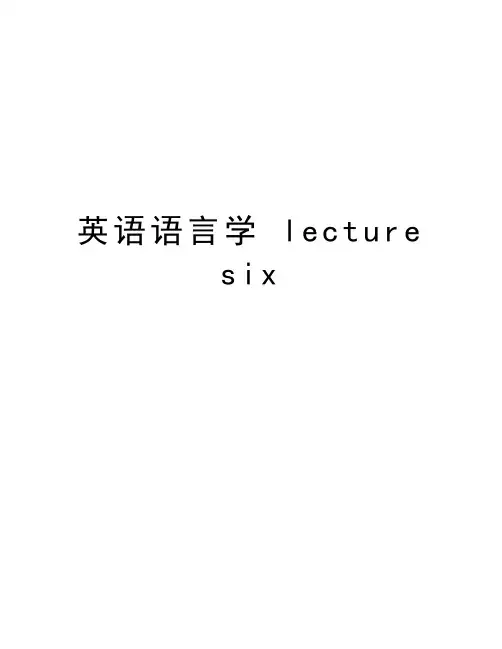
英语语言学l e c t u r es i xReview the chapter of syntaxthese are a few questions on some of points in the chapter of lexicon.Do you think whether the relationship between morpheme and phoneme is one-to-one?How about the relation between morpheme and sememe?What are included in bound morpheme?Syntactic structure句法syntax 研究句子结构,揭示构成某一语言句子的内在规则。
这些规则告诉我们词与词如何组合成句,句子由什么构成。
线性顺序与层次结构linear order and hierarchical structure英语句子是按一定顺序排列的。
句子的这种顺序是线性顺序。
改变顺序意思会发生变化。
这种关系也就是syntagmatic relation or positional relation\ chain relationIn the way of classification according to the word order, there are totally six possible types of language. They are SVO, VSO, SOV, OVS, OSV, VOS.各种语言的句子顺序是不同的。
英语是S-V-O语言,日语、土耳其语等是S-O-V语言,威尔士语和希伯莱等语言是V-S-O语言,也有些语言的主语、动词、宾语的顺序是自由的。
Why is it important to know the relations a sign has with others, such as syntagmatic and paradigmatic relations?As the relation between a signifier and its signified is arbitrary, the value of a sign cannot be determined by itself. To know the identity of a sign, the linguist will have to know the signs it is used together with and those it is substitutable for. The former relation is known as syntagmatic and the latter paradigmatic.The structural linguists regard linguistic units as interrelated with each other in a structure, not as isolated bits.What is the relation of substitutability? And relation of co-ocurrence?语言是交际的工具,人们在交际中说出的最短的话语至少是一个句子,这样才能表达比较完整的思想。
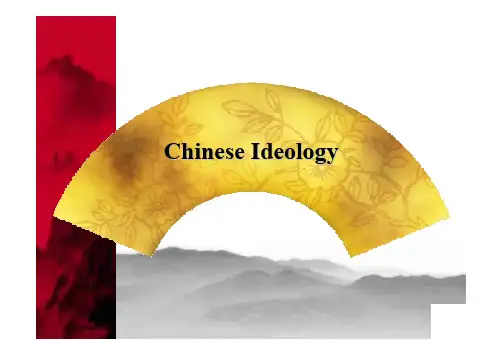
Chinese Ideology|Introduct ionChinese philosophy/ideology has developed over several thousand of years. Its origin can be traced back to the Xia, Shang, and Zhou dynasties. It began to take definite shapes during the Spring and Autumn Period and enjoyed thriving development because of the emergence of the “a hundred schools of thought contend” during the Warring States Period.|A hundred schools of thought contendThe Spring and Autumn and the Warring States Periods (770--221 BC) were a time of great social change, stimulating various schools of thought, such as Confucianism, Legalism, Taoism, and Mohism; and scholars wrote, lectured and debated vigorously, creating a lively academic environment later described as “A hundred schools of thought contend”In general, ancient Chinese philosophy progresses through the following periods: 1. The philosophy in pre-Qin Period The Development The philosophy in pre-Qin of Ancient period was marked by the Chinese emergence of various ancient Ideology philosophical views. The most influential schools were Confucianism, Taoism, Mohism and Legalism.|2. The orthodox philosophy during the Han Dynasty In the Han Dynasty, Emperor Wudi launched a campaign of “banning all schools of thought except Confucianism”. He ruled out various schools of thought and chose officials from those who were steeped (专心于) in Confucianism only. Consequently, Confucianism became an orthodox school that served as the ideological foundation of the feudal rule throughout the dynasties in China.|Orthodox philosophy advocates that Heaven affects human affairs and human behaviour finds responses in Heaven (天人感应) and the power of the emperors are authorized by Heaven (君权神授). Natural disasters are Heaven’s punishment and condemnation of human behaviour. However, human moral conduct, and political and social disorder, in turn, will effect changes in Heaven. This theory, inspired by Dong Zhongshu, is different from the Confucianism’s theory that man is an integral part of nature (天人合一).3. The Buddhist philosophy during the Sui and Tang dynasties During the Sui and Tang dynasties, Buddhism reached its peak. The Buddhist philosophy became aligned with the wisdom of Chinese philosophers. It mainly discusses the relationship between the subjective and the objective. By analysing the spiritual phenomena and human rationality, it attemps to gain insight into the universe and human life.4. Neo-Confucianism in Song and Ming dynastiesIn the Song and Ming dynasties, the rationalistic Confuciain philosophy was of great influence. A new Confucianism developed incorporating the philosophies of Taoism and Buddhism. It maily discusses the relationship between human beings, between man and nature, and between man and society, as well as the nature of human beings.Confucianism | Taoism | The School of Yin and Yang | Legalism Nine Branches | The Schools of Names and Ten | Mohism Schools | The School of Strategists | The School of Eclectics | The School of Agriculture | The School of “Mini-talks|Confucianism|Confucianism is a philosophical school developed from the teachings of the sage Confucius (Kongzi 孔子, 551 – 479 BCE), collected in the Analects of Confucius. It is a system of moral, social, political, and religious thought that has had tremendous influence on Chinese history, thought, and culture down to the 21st century. Some Westerners have considered it to have been the "state religion" of imperial China. Its influence also spread to Korea and Japan.孔子is an ancient sage to the Chinesepeople.social philosopher, whoseteachings and philosophy havedeeply influenced Chinese, Korean,Japanese, and Vietnamese thoughtand life.孔子name as "Confucius."孔子学说的教义|3. Human relationship philosophy —respect between ruler and the subjects; filial piety between family孔子学说的教义3. “li”, moral ways of conduct4. “zhi”, wisdom5. “xin”, faithfulness|Three Obedience and Four Virtues for woman孔子学说的教义which help to maintain social harmony and peace likebenevolence(仁爱), charity, magnanimity(高尚),sincerity, respectfulness, altruism,(利他) diligence, loving kindness, goodness are included in the concept or Ren.孔子学说的教义inflicting on others that which you do not want yourself.”己所不欲,勿施于人.孔子学说的教义|Li for Confucius is the greatest principle of living. When people live by Li the society will attain order and harmony.孔子学说的教义place while all the other stars surrounded it. 为政以德,譬如北辰居其所而众星共之.孔子学说的教义of Confucian classic the Doctrine of the Mean.(中庸)孔子学说的教义endurance can all find their roots in the Confucian concept of Zhongyong.孔子的影响government, school, family and education.孔子的影响entertainment a medium of education, theelicitation method, to draw inferences aboutother cases from one instance, and to learnfrom more than the regular teacher. All theseprinciples not only got rid of the folly inancient pedagogy, but are still giving outtheir brilliance in modern education.孟子Master Meng in English.Mencius is the Latinizationof his name. He is the onlyperson given such privilegeafter Confucius.孟子and should be exercised inthe interest of the commonpeople.孟子respectDistinguishing right from wrong孟子germs just as he has forlimbs”.(恻隐之心,仁之端也;羞恶之心,义之端也;矢让之心,礼之端也;是非之心,智之端也……人之有是四端也,犹其有四体也。
Lecture5:Subgame Perfect EquilibriumNovember1,2006Osborne:ch7How do we analyze extensive form games where there are simultaneous moves? Example:Stage1.Player1chooses between f IN,OUT gIf OUT,game ends,player1gets2and player2gets3If IN,the proceed to stage2,where both players play a simultaneous move game, one-sided prisoners'dilemmaL RT4,30,0B5,01,1In stage2we cannot use backwards induction.But we know how to solve stage2:a Nash equilibrium must be played.Unique NE is stage2,(B;R)Since IN yields payo of1to player1,optimal to choose OUT in stage1.What if there is not a unique prediction in stage2? Eg.stage2game is Hawk-dove game.h dH-1,-14,1D1,42,2In stage2,a Nash equilibrium must be played.Two pure strategy Nash equilibria,(H;d)and(D;h):a)Suppose that(H;d)will be played)payo s will be(4,1)in stage2So in stage1,player1must choose INb)Suppose that(d;H)will be played)payo s will be(1,4)in stage2So in stage1,player1must choose OUT. Two pure strategy subgame perfect equilibria.i)Player1plays IN(in stage1)and H in stage2;player2plays d in stage2. (IN;H;d)ii)Player1plays OUT(in stage1)and d in stage2;player2plays H in stage2. (OUT;d;H)Extensive game with perfect information and simultaneous moves1.Set of players N2.set of nodes X or histories3.E X is a terminal node or history.4.Every player has a payo associated with every terminal node.4.At any history h2X E;a subset of players has to choose an action.(player function)at this node,every player knows what actions have been taken by other players before this.5.at any h where player i has to choose an action A i(h)is the set of available actions.6.Any non terminal node h and the action pro le chosen at h lead to another node h02XA(pure)strategy for a player in an extensive game of perfect information is a plan that speci es an action at each decision node that belongs to her.X i:set of decision nodes where player i must chooseNow more than one player may choose at each decision node.A(x)set of actions available at decision mode xA pure strategy for player i is a function s i:!A(x)satisfying s i(x)2A(x)S i is the set of pure strategies for iIn example,S i=f OUT&T,OUT&B,IN&T,IN&B gSpeci es actions even at nodes that are ruled out by own strategy.If we x a pure strategy for each player,this is a pure strategy pro le s= (s1;s2;:::;s n)This pro le fully determines what happens in the game.If there is no randomness(chance moves),then there is determinate terminal node that results.(if there are chance moves,then s determines a probability distribution over E)So s gives rise to a payo for each player.(S i;u i)i2I is the strategic form ofWe can therefore analyze by analysing its strategic form We can solve for the Nash equilibria of the strategic formA subgame of a extensive game is the game starting from some node x;where one or more players move simultaneously.Subgame Perfect Nash Equilibrium:a pro le of strategies s=(s1;s2;:::;s n) is a subgame perfect Nash equilibrium if a Nash equilibrium is played in every subgame.Example1:(OUT&B,L)is a subgame perfect Nash equilibriumExample2:(IN;H;d)is one SPE(OUT;d;H)is another SPECommittee Decision making(ch7,Osborne) Example:3member committee f A;B;C g3alternatives X=f x;y;z gA B Cx y zy z xz x yStrict preference orderingsVoting system:binary agendastage1:members simultaneously vote whether to adopt x or not If x is chosen,end of story,if notstage2:vote between y and z:majority vote at each stage.members vote strategically{sophisticated votinganticipate the e ects of their choices in futureAnalysis:Stage2:A&B strictly prefer y to zOne Nash equilibrium at this stage where A&b vote for y;y wins (Another Nash equilibrium where all voters vote for same alternative(say z) since no one can make a di erence(with two others voting for z;this is a NE Nash equilibrium involves weakly dominated choice{not reasonable.So y is chosen in stage2In stage1,choice between x and y.A&C strictly prefer x to ytherefore x will be chosen in the subgame perfect equilibrium where voters do not use dominated choices.General model of voting in binary agendasn alternative.odd number of committee members with strict preference orderings(no indi er-ence)majority vote in each stageBinary agenda:sequential procedureadopt x1or not;if not,adopt x2or not;&so on..di erent binary agenda for di erent ordering of votes(e.g.x n;x n 1;:::;x1)What will be the result of sophisticated voting in binary agendas? x beats y if a majority of the committee prefer x to yIf x beats every other alternative,x is a Condorcet winnerA B Cx y yy z xz x zy is a Condorcet winnerCondorcet winner y need not Pareto dominate xProposition:If a Condorcet winner x exists,then x is the undominated subgame perfect equilibrium outcome of any binary agendaProof:By backwards induction,we can determine alternative that will result at any node.At the node h where x can be adopted:Let y be the alternative that will be chosen if x is not chosen.A majority prefers x to y;so x will be adopted at hBy backwards induction,every preceding alternative will be rejected so that we get to hsince x beats every other alternative.What happens if there is no Condorcet winner?x indirectly beats y if eithera)x beats y;orb)there is a sequence of alternatives u1;u2;:::;u k such thatx beats u1&u1beats u2&::::u k 1beats u k&u k beats y:A set of alternatives S X such that every x2S indirectly beats every other alternative in y is a top cycle set.Proposition:If x is the winner of some binary agenda,then x must belong to the top cycle set.Proposition:If x belongs to the top cycle set,then there is some binary agenda such that x wins.。
U1(选修六)1.Abstract1)Adj.深奥的,抽象的Astronomy is an abstract subject. 天文学是一门深奥的学科。
The word “honesty” is an abstract noun.Beauty is abstract but a house is not .美是抽象的,房子是具体的。
2)V.○1“提炼”“抽取”The workers are abstracting metal from ore.工人们正在由矿砂提炼金属。
Rubber is abstractedfrom trees.橡胶是从树木提取的。
Salt can be abstracted from sea water.盐是从海水中提取出来的。
“概括,写摘要”He is abstracting a story for a book review.他在为一篇书评撰写故事摘要。
3)n.an abstract of a lecture一个演讲的摘要2.Would you rather have Chinese or Western-style paintings in your home?would rather do sth情愿做….would rather sb did sth情愿sb做…情愿做….而不愿意做…:would rather do sth than do sth= would do sth rather than do sth= prefer to do sth rather than do sth= prefer doing sth to doing sthI would rather stay at home today. 我今天宁愿待在家里。
I would rather you came here tomorrow. 我宁愿你明天来。
I would rather you hadn’t told me about it yesterday.我宁愿你昨天没有告诉我关于它。
姓名,年级:时间:Period Three Lesson 2 Name StoriesⅠ.写出下列单词的汉语意思(共8小题;每小题2分,满分16分)1。
specific adj。
特定的;详细的2。
hardship n。
艰难,困苦3。
violinist n.小提琴家4。
discourage vt。
使泄气,使灰心5.suffering n.痛苦,困难6.musical adj。
音乐的n.音乐剧,音乐片7。
tease vt。
取笑,嘲笑8。
videophone n.可视电话Ⅱ.写出下列汉语对应的英语单词(共5小题;每小题2分,满分10分)1。
重要性;意义n。
significance→重要的,重大的;影响深远的adj.significant 2.反常的,不正常的adj.abnormal→正常的adj。
normal3。
生动的,逼真的adj。
vivid→生动地adv.vividly4。
起源,开端;出身n。
origin →最初的;原来的adj。
original5。
令人钦佩的adj。
admirable→佩服,羡慕v。
admireⅢ.写出下列短语或短语对应的汉语意思(共8小题;每小题3分,满分24分)1.以……的名字给某人/某物命名name。
after2.偶然遇见come across3。
支撑起hold up4。
count on依靠5.figure out理解6.end up以……结束,以……告终7。
容忍,忍受put up with8.in particular特别,尤其Ⅳ.完成句子(共5小题;每小题10分,满分50分)1.That’s when she was born。
那是她出生的时候.2.Her father thought he was admirable because he built bridges you can really count on.她的父亲认为他受到人们的钦佩是因为他修建了人们真正可以依赖的桥。